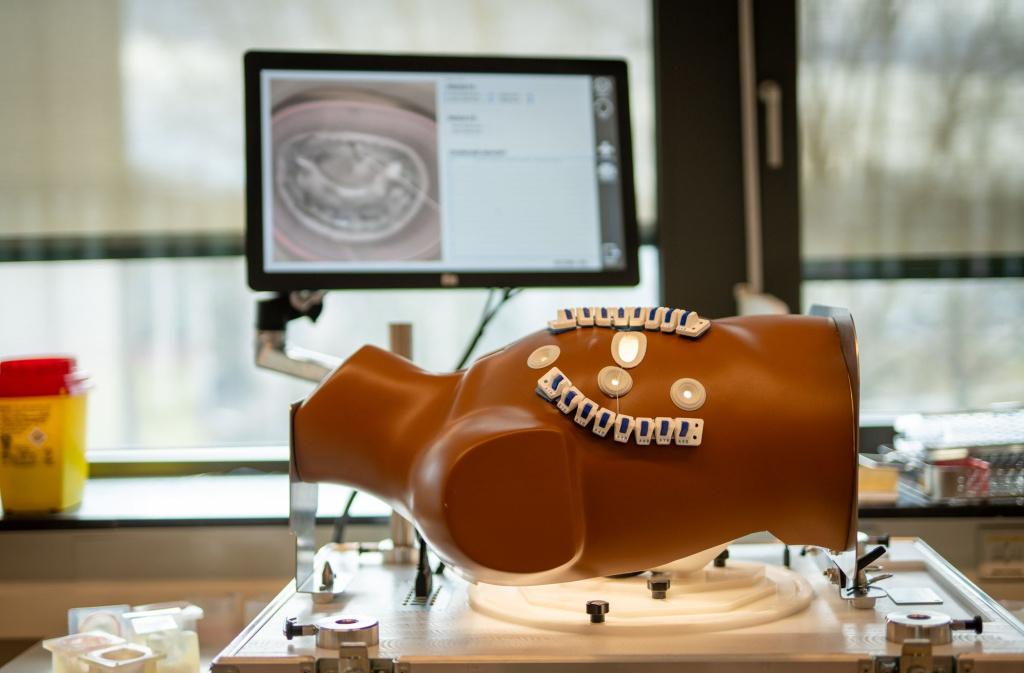In the world of cardiac surgery, precision comes with experience. Cardiothoracic surgeon Peyman Sardari Nia, MD, PhD, affiliated with MUMC+, is pioneering Smart Surgery and simulation training in cardiac surgery. Based in Simurghy, he develops advanced simulation systems that help surgeons refine their skills and better perform complex procedures, such as mitral valve surgery.

Specific skills
.In 2013, after starting minimally invasive cardiac surgery for mitral valve surgery, Sardari Nia noticed that traditional teaching methods were falling short. "In this type of surgery, it is essential to develop specific skills: performing surgery through a small hole in the patient's body with limited visibility. This requires not only dexterity but also experience."
This insight led to the development of a high-fidelity simulation platform. A system that allows surgeons to practice complex operations, such as mitral valve replacements, endlessly in a safe, controlled environment before actually venturing into a patient. The continued use and success of this simulation platform resulted in the creation of Simurghy.
Less risk, better results
What makes Simurghy unique is the way technology enhances surgeons' learning. "Mistakes during surgery can be fatal. We make it possible to shorten surgeons' learning curve and improve the quality of operations," said Sardari Nia.
The impact is significant. "The simulators allow cardiac surgeons to develop their skills without risk to patients, and be better prepared for contingencies that may arise during a real operation. This not only benefits the quality of care, but also lowers costs for hospitals by reducing the number of complications."
"The simulators enable cardiac surgeons to develop their skills without risk to patients, and to be better prepared for contingencies that may arise during a real operation"
The investment by LIOF and venture capital partner Percival played a key role in scaling up Simurghy. It involved a funding request from the Participation Fund. This has allowed the company to refine and even expand its simulation systems into other areas within cardiac surgery, such as the aortic valve. "The investment allowed us to set up a training center and further develop the technology, which now allows us to reach more physicians worldwide," explains Sardari Nia.
There is much ambition to expand the technology even further. Simurghy not only wants to improve the training of surgeons, but also to develop a broader application for other surgical procedures. The ultimate goal? Improving patient care worldwide through simulation-driven training and precision surgery.
The Future of Smart Surgery
According to Sardari Nia, the concept of Smart Surgery is the future of healthcare. "Technologies such as 3D printing, simulation, artificial intelligence and digital twin offer huge opportunities to improve care. We can use them to better select the patient, specify the treatment and make operations even safer," he says.
Simurghy is just the beginning. Sardari Nia envisions a future in which simulation-driven training is a must in healthcare. "In aviation, pilots have been trained in simulators for years. It's time for healthcare to follow this same path, because it simply doesn't make sense to continue performing operations without simulation."
A Bigger Mission
For Sardari Nia, it's not just about technological advances, but also about societal impact. His mission is to make the medical world safer by implementing simulation-driven training. "It's not about making a profit, but about improving the care and lives of patients," he emphasizes. "The technology Simurghy develops has a clear social and philanthropic impact, which makes the company unique."
Looking forward
Sardari Nia's message to other innovators? "Be clear about the problem you want to solve and believe in your solution. It's not just important to have a good product, but to share a passion and vision that convinces others."
Simurghy has taken the first steps. Thanks to the pioneering spirit of Peyman Sardari Nia and the support of LIOF and Percival, this innovation opens the door to a smarter, safer and more effective future of cardiac surgery.